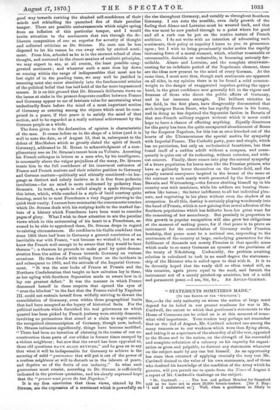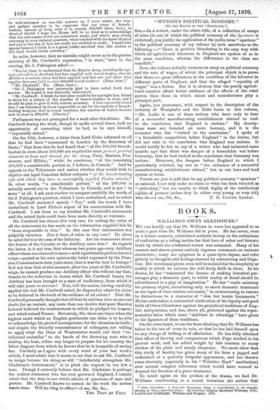"STATEMENTS SOMETIMES MADE."
[TO THE EDITOR OF THE "SPECTATOR.']
SIR,—As the only authority on whom the nation at large must depend for its belief in our present readiness for war is Mr. Cardwell, the extent to which that gentleman's statements to the House of Commons can be relied on is at this moment of some- what vital importance. Your readers may perhaps not remember that on the 2nd of August, Mr. Cardwell selected one among the many rumours as to our weakness which were then flying about, and taking it as a specimen of the absurdity of all the rest, appealed to the House and to the nation, on the strength of his successful and complete refutation of a calumny on his capacity for organi- zation so gross and palpable, to distrust any statements whatever on the subject made by any one but himself. As an opportunity has since then occurred of applying crucially the very test Mr. Cardwell desired to the value of his own statements, and of those who doubted his knowledge of the condition of the Army which he governs, will you permit me to quote from the Times of August 3 a report of Mr. Cardwell's challenge on the subject.
"Mr. Cardwell The hon. and gallant Member for Stamford told us we have not in store 20,000 breech-loaders. [Sir J. Hay: 'I said I understood sol Well, when a gentleman so likely to be well-informed on war-like matters as, I must admit, the hon. and gallant member to be, supposes that our store of breech- loaders, instead of being what it is, namely, 300,000 (hear, hear), is short of 20,000 I hope the House will be so kind as to acknowledge that the statements which are sometimes made, and which may obtain currency in very eminent quarters, when touched with the spear of proof and pat to the test of fact are really not entitled to credit. I make this appeal because I think it is a great public mischief that idle stories of this kind should obtain currency."
In order, however, that no mistake might occur as to the precise meaning of Mr. Cardwell's expression, "iii store," later in the evening, Sir J. Pakington asked :—
" Was he, then, to understand that the Regular Army, including the regi- ment referred to in Scotland, had been supplied with breech-loaders, that the Militia to a certain extent had been supplied; and that over and above these supplies there was [sic] in store 300,000 breech-loaders? (Hear, hear.)"
" Mr. Cardwell : Yes. (Hear, hear.) "Sir J. Pakington was extremely glad to have called forth that answer. He hoped it was distinctly understood.
"Mr. Cardwell : I think the best plan would be for my right hon. friend to move for a return of the number of breech-loaders in store, and I should be glad to give it with minute accuracy. I have repeatedly stated that I am informed by those responsible to me for the custody of breech- loading weapons, that in round numbers, the number of breech-loaders now in store is 300,000. (Cheers.)" Parliament was not prorogued for a week after this debate. Mr. Cardwell during the week, though he spoke several times, took no opportunity of correcting what he had, as he says himself, "repeatedly stated."
On the 19th, however, a letter from Lord Elcho informed us all that he had been "summoned to London by the Secretary of State ; " that from him he bad heard that "of the 300,000 breech- loaders in store about 100,000 are required to meet present pressing demands at home and abroad for the Army, Navy, Marines, Pen- sioners, and Militia ; " while, he continues, "of the remaining 200,000 a considerable portion is, I believe, in Canada." And he appeals to the Volunteers and nation whether they would wish to deprive our loyal Canadian fellow-subjects "of the breech-loading rifle with which they have so successfully repelled Fenian attacks." In other words, "a considerable portion" of the 200,000 is actually served out to the Volunteers in Canada, and is not" in store" at all. I ask your readers to compare carefully the words of SirJ. Pakington's question, which I have underlined, and to which Mr. Cardwell answered merely "Yes," with the words I have underlined in Lord Elcho's report of his conversation with Mr. Cardwell. I ask them to say whether Mr. Cardwell's statements and the actual facts could have been more directly at variance.
Mr. Cardwell has chosen this very case for testing the value of all the statements he has made on the information supplied him by "those responsible to him." In this case that information was palpably valueless. Has it been of value in any case ? He chose to select for test the arm of the Infantry. Are his statements about the horses of the Cavalry or the Artillery more true ? As regards the latter, is it not true that whereas two years ago every Artillery officer whom one chanced to meet—with a pardonable pride in his own corps—quoted as his own opinion the belief expressed by the Prus- sian Commissioners four years since, that it was the best in Europe ? Is it not true that at this moment, after two years of Mr. Cardwell's reign, he cannot produce one Artillery officer who will not say that, thanks to the reduction in horses which Mr. Cardwell boasts, the Artillery has been brought to a state of inefficiency, from which it will take years to recover? If so, will the nation, having carefully applied the test Mr. Cardwell asked, be disposed to admit his claim to be believed in the teeth of the evidence of all others ? That Mr. Cardwell personally thought that all that he said was true no one can doubt for an instant, any more than one doubts that poor Marshal Lebceuf believed the misstatement to which he pledged his hour, and which ruined France. But surely, Sir, there are times when the highest merit which an English gentleman can claim is to be able to acknowledge his proved incompetence for the situation he holds; and despite the friendly remonstrances of colleagues; not willing to apply what the Dean of Westminster would call their "in- tellectual umbrellas" to the hands of the drowning man who is sinking the boat, refuse any longer to prepare for his country the bitter disgrace from which he knows that he is incapable of saving her. Cordially as I agree with every word of your last week's article, I must admit that it seems to me that to ask Mr. Cardwell to resign because his doing so will "indefinitely strengthen Mr. Gladstone's Government," is to pitch the request in too low a tone. Though I earnestly believe that Mr. Gladstone is perhaps the noblest statesman who has ever governed England, I cannot admit that the time is one which admits of questions of men and parties. Mr. Cardwell knows he cannot do the work the nation wants done. Will he cling to office ?—I am, Sir, &c.,































 Previous page
Previous page